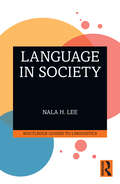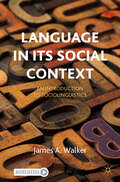- Table View
- List View
Language in African American Communities (Routledge Guides to Linguistics)
by Sonja LanehartLanguage in African American Communities is essential reading for anyone with an interest in the language, culture, and sociohistorical contexts of African American communities. It will also benefit those with a general interest in language and culture, language and language users, and language and identity. This book includes discussions of traditional and non-traditional topics regarding linguistic explorations of African American communities that include difficult conversations around race and racism. Language in African American Communities provides: • an introduction to the sociolinguistic and paralinguistic aspects of language use in African American communities; sociocultural and historical contexts and development; notions about grammar and discourse; the significance of naming and the pall of race and racism in discussions and research of language variation and change; • activities and discussion questions which invite readers to consider their own perspectives on language use in African American communities and how it manifests in their own lives and communities; and • links to relevant videos, stories, music, and digital media that represent language use in African American communities. Written in an approachable, conversational style that uses the author’s native African American (Women’s) Language, this book is aimed at college students and others with little or no prior knowledge of linguistics.
Language in Late Capitalism: Pride and Profit (Routledge Critical Studies in Multilingualism)
by Alexandre Duchêne Monica HellerThis book examines the ways in which our ideas about language and identity which used to be framed in national and political terms as a matter of rights and citizenship are increasingly recast in economic terms as a matter of added value. It argues that this discursive shift is connected to specific characteristics of the globalized new economy in what can be thought of as "late capitalism". Through ten ethnographic case studies, it demonstrates the complex ways in which older nationalist ideologies which invest language with value as a source of pride get bound up with newer neoliberal ideologies which invest language with value as a source of profit. The complex interaction between these modes of mobilizing linguistic resources challenges some of our ideas about globalization, hinting that we are in a period of intensification of modernity, in which the limits of the nation-State are stretched, but not (yet) undone. At the same time, this book argues, this intensification also calls into question modernist ways of looking at language and identity, requiring a more serious engagement with capitalism and how it constitutes symbolic (including linguistic) as well as material markets.
Language in Society (Routledge Guides to Linguistics)
by Nala H. LeeLanguage in Society introduces the study of the relationship between language and society, also known as sociolinguistics, without assuming any prior knowledge of linguistics. Introducing the key concepts in an accessible way, Lee illustrates how language develops constantly as a response to society and must be understood in the context of societal norms, processes, and events. The book: Provides a short history of the field and explores the types of questions that can be asked in sociolinguistics as well as its methods Introduces essential concepts such as sociolinguistic variation, multilingualism, and contact languages Discusses contemporary topics including issues of language endangerment, language and justice, as well as language and computing Includes examples and case studies from the Asia Pacific and focuses on highlighting research from the Southern hemisphere Provides discussions of the future trajectory of the field and some reflection points on practical applications for each chapter Language in Society is key reading for students studying this topic for the first time with little or no background in linguistics.
Language in a Failed State: Public Discourse in the Lebanese Crisis
by Samia BazziThis book examines public, political and media discourse in the context of failed states using Lebanon, a country torn by wars and political-financial corruption, as a contemporary case study. Using critical discourse analysis (CDA), the author brings political and economic theories into dialogue with socio-linguistics to argue that public discourse in a failed state not only plays a role in that collapse but is a key presenting symptom of social disintegration. Through CDA, the book makes this phenomenon visible, and contributes to existing definitions of the concept “failed” or “fragile” state. In addition, the qualitative data and analysis provided offer a tool to assess a state’s vulnerability to collapse. The book also expands the sociolinguistic model to eavesdrop on the zeitgeist of the nation in order to examine the degrees of social cohesion, sectarianism and bonding. This book will be of interest to discourse analysts, journalists, politicians, policy-makers, and economists.
Language in a Globalised World: Social Justice Perspectives on Mobility and Contact
by Khawla BadwanThis book takes a critical look at the role of language in an increasingly diversified and globalised world, using the new framework of 'sociolinguistics of globalisation' to draw together research from human geography, sociolinguistics, and intercultural communication. It argues that globalisation has resulted in a destabilisation of social and linguistic norms, and presents a ‘language-in-motion’ approach which addresses the inequalities and new social divisions brought by the unprecedented levels of population mobility. This book looks at language on the individual, national and transnational level, and it will be of interest to readers with backgrounds in history, politics, human geography, sociolinguistics and minority languages.
Language in its Social Context: An Introduction to Sociolinguistics
by James A. WalkerThis textbook provides an accessible overview of the field of sociolinguistics. Blending qualitative and quantitative approaches and including examples drawn from different contexts and societies all over the world, the author introduces progressively complicated topics to help students build their confidence and understanding gradually as they work through the book. The chapters cover all the core topics on an introductory sociolinguistics course, including language and power, dialects, language and gender, language planning and multilingualism, and each chapter ends with a set of exercises, suggestions for small-scale projects which the author has used successfully with his own students and suggested further readings (both classic and more recent). This book assumes no background in Linguistics and is intended as an introduction to sociolinguistics that can be used at any level of undergraduate or graduate study, or by interested outsiders to the field.
Language in the British Isles
by David BritainThe British Isles are home to a vast range of different spoken and signed languages and dialects. Language continues to evolve rapidly, in its diversity, in the number and the backgrounds of its speakers, and in the repercussions it has had for political and educational affairs. This book provides a comprehensive survey of the dominant languages and dialects used in the British Isles. Topics covered include the history of English; the relationship between Standard and Non-Standard Englishes; the major non-standard varieties spoken on the islands; and the history of multilingualism; and the educational and planning implications of linguistic diversity in the British Isles. Among the many dialects and languages surveyed by the volume are British Black English, Celtic languages, Chinese, Indian, European migrant languages, British Sign Language, and Anglo-Romani. Clear and accessible in its approach, it will be welcomed by students in sociolinguistics, English language, and dialectology, as well as anyone interested more generally in language within British society.
Language in the Inner City: Studies in the Black English Vernacular (Conduct and Communication)
by William Labov<p>With the recent controversy in the Oakland, California school district about Ebonics—or as it is referred to in sociolinguistic circles, African American Vernacular English or Black English Vernacular—much attention has been paid to the patterns of speech prevalent among African Americans in the inner city. <p>In January 1997, at the height of the Ebonics debate, author and prominent sociolinguist William Labov testified before a Senate subcommittee that for most inner city African American children, the relation of sound to spelling is different, and more complicated than for speakers of other dialects. He suggested that it was time to apply this knowledge to the teaching of reading. <p>The testimony harkened back to research contained in his groundbreaking book Language in the Inner City, originally published in 1972. In it, Labov probed the question "Does 'Black English' exist?" and emerged with an answer that was well ahead of his time, and that remains essential to our contemporary understanding of the subject. <p>Language in the Inner City firmly establishes African American Vernacular English not simply as slang but as a well-formed set of rules of pronunciation and grammar capable of conveying complex logic and reasoning. Studying not only the normal processes of communication in the inner city but such art forms as the ritual insult and ritualized narrative, Labov confirms the Black vernacular as a separate and independent dialect of English. His analysis goes on to clarify the nature and processes of linguistic change in the context of a changing society. <p>Perhaps even more today than two decades ago, Labov's conclusions are mandatory reading for anyone concerned with education and social change, with African American culture, and with the future of race relations in this country.</p>
Language is Politics: Exploring an Ecological Approach to Language
by Frank van SplunderLanguage is Politics discusses power relations between languages in the world, with a particular focus on English. Even though English is the most widely spoken and the most powerful language worldwide, it is not the lingua franca it is often supposed to be. The basic tenet of this book is that languages do not exist in the natural world; they are artefacts made by humans. The book debunks some common myths about language and it suggests that we should be more modest in our assumptions, for instance concerning the linguistic uniqueness of our own species. The author argues in favour of an ecological or balanced approach to language. This approach sees humans and other animals as part of the larger ecosystems that life depends on. As in nature, diversity is crucial to the survival of languages. The current linguistic ecosystem is out of balance, and this book shows that education can help to restore the balance and cope with the challenges of a multilingual and multicultural world. With an ecological approach to language and a focus on narratives and personal language histories, this will be key reading for researchers and academics, as well as students of English language and linguistics.
Language of Social Casework (Routledge Revivals: Noel Timms #7)
by Noel TimmsOriginally published in 1968, Language of Social Casework considers the way in which social workers commonly neglect language. It is suggested that part of this neglect is due to the ways in which social workers and their critics envisage the activity of social work. The traditional criticisms of philanthropy and social work, are, therefore reviewed, and an attempt made to describe some common responses to them on the part of the practitioners. This is followed by an examination of two terms that are of some importance in the language of casework: the ‘generic-specific’ concept, and the idea of the ‘settings’ of casework. But casework is also described in terms borrowed from other ‘contexts: it is seen as ‘art’ or ‘science’, as a ‘therapy’ or the offer of ‘friendship’. Each of these descriptions is considered in the last two chapters of the book. The book also includes a brand new and fully updated preface by the author, contextualising this 1968 publication, in light of advancements made in the past 50 years.
Language variation and change in social networks: A bipartite approach (Routledge Studies in Language Change)
by Robin Dodsworth Richard A. BentonThis monograph takes up recent advances in social network methods in sociology, together with data on economic segregation, in order to build a quantitative analysis of the class and network effects implicated in vowel change in a Southern American city. Studies of sociolinguistic variation in urban spaces have uncovered durable patterns of linguistic difference, such as the maintenance of blue collar/white collar distinctions in the case of stable linguistic variables. But the underlying interactional origins of these patterns, and the interactional reasons for their durability, are not well understood, due in part to the near-absence of large-scale network investigation. This book undertakes a sociolinguistic network analysis of data from the Raleigh corpus, a set of conversational interviews collected form natives of Raleigh, North Carolina, from 2008-2017. Acoustic analysis of the corpus shows the rapid, ongoing retreat from the Southern Vowel Shift and increasing participation in national vowel changes. The social distribution of these trends is explored via standard social factors such as occupation as well as innovative network variables, including a measure of nestedness in the community network. The book aims to pursue new network-based questions about sociolinguistic variation that can be applied to other corpora, making this key reading for students and researchers in sociolinguistics and historical linguistics as well as those interested in further understanding how existing quantitative network methods from sociological research might be applied to sociolinguistic data.
Language, Ability and Educational Achievement (Routledge Library Editions: Philosophy of Education #20)
by Christopher WinchThis title, first published in 1990, engages in the current debates about the teaching of literacy and the reform of education. Based on his dissatisfaction with prevalent theories of educational achievement and his experience of teaching in elementary schools, Winch argues that the dichotomy of biological inheritance and environmental influence is inadequate to describe the diverse phenomena of educational achievement. This title will be of interest to students of the philosophy of education.
Language, Aging and Society: What Can Linguistics Do for the Aging World?
by Lihe Huang Boyd DavisThis book explores how studies of language and aging can be applied to build an aging-friendly society, drawing on the socio-pragmatic turn in language and aging to examine the perspectives of older adults experiencing aging through a linguistic lens. Research on the phenomenon and mechanisms of language in aging can provide older adults with language training, increase their active aging, and offer improved information communication channels for an aging society, which will bring a series of clinical and social benefits to handle problems in aging and language across the world. This book will be of interest to researchers in linguistics, sociology, gerontology and related fields.
Language, Bureaucracy and Social Control (Real Language Series)
by Srikant Sarangi Stefan SlembrouckLanguage, Bureaucracy and Social Control explores the varying inter-relationships between language, forms of bureaucratic organisation and social control. The text provides a detailed examination of the discursive dimensions of some of the key techniques of modern power: the 'productive' surveillance practices of administrative and public service institutions. Special attention is paid to recent developments within the state domain and the private economy such as the introduction of consumerism and promotional practices in welfare institutions, and the spread of bureaucratisation in contexts such as banking and education.
Language, Culture, and Identity among Minority Students in China: The Case of the Hui (Routledge Series on Schools and Schooling in Asia #3)
by Yuxiang WangThis book explores Hui (one of the Muslim minority groups in China) students’ lived experiences in an elementary school in central P. R. China from the perspectives of philosophical foundations of education and the sociology of education, the impact of their experiences on their identity construction, and what schooling means to Hui students. The book describes a vivid picture of how the Hui construct their own identities in the public school setting, and how the state curricula, teachers, and parents play roles in student identity construction. The objectives of the book are to discover factors that impact Hui students’ identity construction and have caused Hui students to know little about their own culture and language; and to explore what should be done to help teachers, administrators, and policy makers appreciate minority culture and include minority culture and knowledge in school curriculum in order to meet the needs of Hui students.The book provides historical, policy, and curricular contexts for readers to understand Hui students’ experiences in central China, and discusses the cultural differences between Han and Hui from a philosophical level. The book uses postcolonial theory to critique the assimilative nature of school education, the construction of Hui students’ identity from Han ideology, and the cultural hegemony of the mainstream Han group. It also discusses curriculum reconceptualization both in China and globally, and the possibility of multicultural education in China.
Language, Education, and Identity: Medium in South Asia
by Chaise LaDousa; Christina P. DavisThis book examines medium of instruction in education and studies its social, economic, and political significance in the lives of people living in South Asia. It provides insight into the meaning of medium and what makes it so important to identity, aspiration, and inequality. It questions the ideologized associations between education and social and spatial mobility and discusses the gender- and class-based marginalization that comes with vernacular-medium education. The volume also considers how policy measures, such as the Right to Education (RTE) Act in India, have failed to address the inequalities brought by medium in schools, and investigates questions on language access, inclusion, and rights. Drawing on extensive fieldwork and in-depth interviews, the book will be indispensable for students and scholars of anthropology, education studies, sociolinguistics, sociology, and South Asian studies. It will also appeal to those interested in language and education in South Asia, especially the role of language in the reproduction of inequality.
Language, Ethnography, and Education: Bridging New Literacy Studies and Bourdieu (Real Language Ser.)
by Jennifer Rowsell Kate Pahl Michael Grenfell David Bloome Brian V Street Cheryl HardyThis frontline volume contributes to the social study of education in general and literacy in particular by bringing together in a new way the traditions of language, ethnography, and education. Integrating New Literacy Studies and Bourdieusian sociology with ethnographic approaches to the study of classroom practice, it offers an original and useful reference point for scholars and students of education, language, and literacy wishing to incorporate Bourdieu’s ideas into their work. More than just a set of stand-alone chapters around social perspectives on language interactions in classrooms, this book develops and unfolds dialogically across three sections: Bridging New Literacy Studies and Bourdieu – Principles; Language, Ethnography and Education - Practical Studies; Working at the Intersections – In Theory and Practice. The authors posit ‘Classroom Language Ethnography’ as a genuinely new perspective with rich and developed traditions behind it, but distinct from conventional approaches to literacy and education — an approach that bridges those traditions to yield fresh insights on literacy in all its manifestations, thereby providing a pathway to more robust research on language in education.
Language, Gender and Ideology: Constructions of Femininity for Marriage
by Saumya SharmaThis book explores multiple facets of femininity for marriage in India. Using language as an entry point, it looks at how and why media representations of gender identities are constructed the way they are. It works with a unique synthesis of second-wave feminist discourse and empirical linguistic research to look at how the social institution of marriage becomes the site of interaction between language, ideology, psyche and culture. This volume also brings together the personal histories and views of women who discuss how media, modernity and social norms shape their ideas about marriage and selfhood. Deconstructing perceptions of femininity in contemporary India, the book will be of great interest to scholars and researchers of sociology, gender studies, linguistics, media and cultural studies and psychoanalysis.
Language, Gender and Politics in Central and Eastern Europe (Palgrave Studies in Language, Gender and Sexuality)
by Ksenija BogetićThis volume is the first book-length collection of research on language, gender and sexuality in the societies of central and eastern Europe. Spanning a range of languages and political contexts, the chapters shed light on the intense debates that connect language use, gender equality, sexuality, history and belonging in this region today, while advancing perspectives on semiotic resignification that complicate some western-dominated frameworks in the discipline. Focused on a space increasingly described as a hub of ‘anti-gender’ hostility – as we currently witness in the curtailing of abortion rights, removal of gender from curricula and institutionalisation of anti-LBGTQ rhetoric – the book also foregrounds the rich continuities of feminist theory and protest in post-socialist societies, and their import for rethinking transnational sociolinguistic perspectives on heteronormative patriarchy, ‘anti-genderism’, neoliberalism, imperialism and conflict. Showcasing a range of approaches, themes and angles of inquiry, the book will be of interest to scholars and postgraduate students researching the topics of gender and sexuality within linguistics, but also within other interdisciplinary areas of the humanities and social sciences.
Language, Gender and Videogames: Using Corpora to Analyse the Representation of Gender in Fantasy Videogames
by Frazer HeritageThis book explores how corpus linguistic techniques can be applied to close analysis of videogames as a text, particularly examining how language is used to construct representations of gender in fantasy videogames. The author demonstrates a wide array of techniques which can be used to both build corpora of videogames and to analyse them, revealing broad patterns of representation within the genre, while also zooming in to focus on diachronic changes in the representation of gender within a best-selling videogame series and a Massively Multiplayer Online Role Playing Game (MMORPG). The book examines gender as a social variable, making use of corpus linguistic methods to demonstrate how the language used to depict gender is complex but often repeated. This book combines fields including language and gender studies, new media studies, ludolinguistics, and corpus linguistics, and it will be of interest to scholars in these and related disciplines.
Language, Gender, and Sexuality: An Introduction (Routledge Guides to Linguistics)
by Scott F. KieslingLanguage, Gender, and Sexuality offers a panoramic and accessible introduction to the ways in which linguistic patterns are sensitive to social categories of gender and sexuality, as well as an overview of how speakers use language to create and display gender and sexuality. This book includes discussions of trans/non-binary/genderqueer identities, embodiment, new media, and the role of language and interaction in sexual harassment, assault, and rape. Drawing on an international range of examples to illustrate key points, this book addresses the questions of: how language categorizes the gender/sexuality world in both grammar and interaction; how speakers display, create, and orient to gender, sexuality, and desire in interaction; how and why people display different ways of speaking based on their gender/sexual identities. Aimed at students with no background in linguistics or gender studies, this book is essential reading for anyone studying language, gender, and sexuality for the first time.
Language, Gender, and Sexuality: An Introduction (Routledge Guides to Linguistics)
by Scott F. KieslingLanguage, Gender, and Sexuality offers a panoramic and accessible introduction to the ways in which linguistic patterns are sensitive to social categories of gender and sexuality, as well as an overview of how speakers use language to create and display gender and sexuality. Revised to include the latest developments, this book covers discussions of trans/nonbinary/genderqueer identities, embodiment, new media, and the role of language and interaction in sexual harassment, assault, and rape.Drawing on an international range of examples to illustrate key points, this book addresses the questions of:• how language categorizes the gender/sexuality world in both grammar and interaction;• how speakers display, create, and orient to gender, sexuality, and desire in interaction;• how and why people display different ways of speaking based on their gender/sexual identities.The second edition has been fully updated and now includes new sections on political discourse and social media, more discussion questions, and new extensive online resources with student activities and instructor materials. Aimed at students with no background in linguistics or gender studies, this book is essential reading for anyone studying language, gender, and sexuality for the first time.
Language, Health and Culture: Problematizing the Centers and Peripheries of Healthcare Communication Research (Routledge Studies in Language, Health and Culture)
by Susan M. Bridges Olga Zayts-SpenceLanguage, Health and Culture brings together contributions by linguistic scholars working in the area of health communication in Asia—in particular, in Hong Kong, Mainland China, Singapore, Japan and Taiwan. Olga Zayts-Spence and Susan M. Bridges, along with the contributors, draw on a diverse range of authentic data from different (primary, secondary, digital) healthcare contexts across Asia. The contributions probe empirical analyses and meta-reflections on the empirical, epistemological and theoretical foundations of doing research on language and health communication in Asia. While many of the medical and technological advances originate from the ‘non-English-dominant’/‘peripheral’ contexts, when it comes to health communication, there is a strong tendency to downplay and marginalize the scope and the impact of the ripe research tradition in these contexts. The contributions to the edited volume problematize the hegemony of dominant (Anglocentric) traditions in health communication research by highlighting culture- and context-specific ways of interpreting different health realities through linguistic lenses.
Language, Hegemony and the European Union
by Glyn Williams Gruffudd WilliamsThis book critically examines the European Union's "Unity in Diversity" mantra with regard to language. It uses a theoretical framework based on hegemony both as a system and as a relationship. Operating within sociolinguistics, the book replaces the notion of ideology in poststructuralist thought with that of hegemony. The authors argue that forging unity across language communities contradicts the tenets of classical liberal theory. Global neo-liberalism influences this orthodoxy, shifting the parameters of power and political control. Over nine chapters, the authors cover topics such as globalization and social change, justice, governance and education. The book will be of interest to sociolinguists, political scientists, sociologists, as well as scholars of language and globalization and European studies.
Language, Identity Online and Running
by Nur Kurtoğlu-HootonThis book focuses on language and identity online within the context of running from an interdisciplinary perspective. It brings together digital ethnography, existential phenomenology, interpretative phenomenological analysis and sporting embodiment in the pursuit to explore runners’ lived experiences and identities online. Language, identity and identity online are often studied in broader social contexts such as education, culture and politics, and running is intimately related to key issues in contemporary society, such as health and exercise, sport and nationalism, embracing a variety of discourse types and having implications more generally for our identity as human beings. The evolving online media through which people make sense of who they are and which groups they belong to are enabling new ways of realising identities and relationships. This book will be of interest to applied linguists, discourse analysts, as well as those interested in sports, sports psychology, and identity enactment.
























